سناء محمد علي سودانية مقيمة باليابان وتمتلك مطعماً رائعاً جداً يقدم أشهى الوجبات !!
Kebabooz
A
hidden gem in the streets of Daimyo, Kebabooz offers
a unique opportunity for customers to try delicious authentic Sudanese and Middle Eastern cuisine prepared by internationally-influenced Sudanese native, Sana Mohamed Ali. Regardless of what you might like, Kebabooz probably has something for you; from superb vegetarian varieties to mouthwatering Halal meat grills (beef, lamb and chicken). Some of the most prominent items on the menu include Sudanese Falafel (Tamiya); Hummus; and Sudanese stew, a thick lamb-and-vegetable soup served with rice or pita bread. If you’re up for something new, try the tamarind juice made from the sweet-and-sour tamarind fruit, indigenous to Sudan. Even the restaurant itself offers the full Sudanese experience while you eat, from the traditional wall decorations – including ebony masks and Sana’s bridal scarf, down to the Sudanese music. With bring your own -if you like- alcohol system, whether you are stopping for a quick bite or looking to add a twist to your next date, Kebabooz will give you that unique experience you can’t have anywhere
a unique opportunity for customers to try delicious authentic Sudanese and Middle Eastern cuisine prepared by internationally-influenced Sudanese native, Sana Mohamed Ali. Regardless of what you might like, Kebabooz probably has something for you; from superb vegetarian varieties to mouthwatering Halal meat grills (beef, lamb and chicken). Some of the most prominent items on the menu include Sudanese Falafel (Tamiya); Hummus; and Sudanese stew, a thick lamb-and-vegetable soup served with rice or pita bread. If you’re up for something new, try the tamarind juice made from the sweet-and-sour tamarind fruit, indigenous to Sudan. Even the restaurant itself offers the full Sudanese experience while you eat, from the traditional wall decorations – including ebony masks and Sana’s bridal scarf, down to the Sudanese music. With bring your own -if you like- alcohol system, whether you are stopping for a quick bite or looking to add a twist to your next date, Kebabooz will give you that unique experience you can’t have anywhere
Tel: 092-716-9192
Menu: Kebab or Tamiya Sandwich ¥500, Hummus ¥500, Kufta Plate ¥1,050, Stew ¥500~, Vegetarian Green Plate ¥1,100, Mix Grill ¥1,200, Tropical Juices ¥300
•••••••••••••••••••••••••••••••••••••••••••••••••••••••••••••••••••••••••••
After the gourmet report, Rachel Cantrell chatted with Kebabooz owner Sana about life in Japan. Here’s part of the conversation…
Tell us about yourself.
That’s a tough one! Sometimes I may be a little shy in the beginning, and even more if you ask me to talk about myself– but when I get to know people, I’m a very talkative person. [laughs] I’m a social person. I love making friends. This is one of the things that makes me enjoy my work at [Kebabooz] — meeting new people.
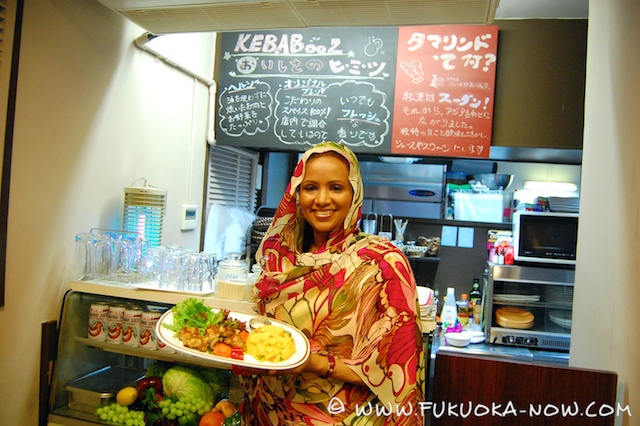
What is Kebabooz?
Let’s start from the beginning: the idea. When I first came to Japan, I didn’t find [kebabs] — especially here in Fukuoka. I loved kebabs back at home, and it wasn’t easy to find kebabs in Kyushu. And I was so surprised because I’ve lived in Sudan and a few countries in the Middle East, and it was like an “atarimae” thing to find kebabs. So it was a big surprise not to find kebabs in Japan. I was craving for them, and wanted to eat them all the time. The beginning of the idea came about catering, for parties and stuff, when I catered for my own home parties. People loved the food. Sudanese people may be shy by nature — I don’t know why, but we lack the confidence in our own food and our own culture. We always think that the world has better to offer, so we don’t go offer what we have. But because I lived abroad in my childhood and I know how my mother’s friends of different nationalities reacted to the food she made, I had more courage than most other Sudanese ladies who lived here or in other countries — I think I was more confident when I offered our own food and culture in our home parties, and it was a big pleasure to see people enjoy it and always ask for more! One of the things I love about Japanese people is that they are not shy with food. They are shy in other spots, but they are not shy with food. They love to try new things and if they want more, they ask for more. If there is “nokorimono,” they ask to take it home, which was a little bit of a culture shock for me – in Sudan, even if you want it, you don’t usually ask! But in Japan, people enjoy the food and they always want to introduce it to other family members who are not at the party. Whenever there was “nokorimono,” leftovers, they’d ask if it was okay to take it. And I’d be so happy because the guests enjoyed it so much they wanted to share it with family back home, and also it’s a good chance to get rid of the leftovers [laughs]
I remember one of the parties that gave me the biggest motivation. I remember before guests came, I was so worried, them being prestigious and well-off people — was my food going to please them? But then I thought, they probably never tried Sudanese food anywhere, because they haven’t been to Sudan — and in other parts of the world, Sudanese food is not a very common thing. So, I thought, that’s my chance. That’s the arena I can play in. So I did make international food, plus Middle Eastern, plus Sudanese dishes, all in this same party.
And people loved the food. For my own shock and happiness, they asked to take the Sudanese food! And there was the Sudanese peanuts chili sauce. The ladies all had brand bags, and they wanted to take this sauce with them, but I didn’t have “iremono” to put it in for everybody. So ,they actually took paper cups and plastic cups and they put the sauce in it — they divided it — and they wrapped it with plastic wrap. I was looking for disposable bags to put it in, or something, but they said, “No, no, no, it’s okay!” and put it in their expensive brand bags. And you can imagine how I felt at that time. I was so proud.
And they said, “why don’t you open a restaurant?” I said, “If I open it, will you come and eat there?” They said, “Yes, sure, we’d love to.”
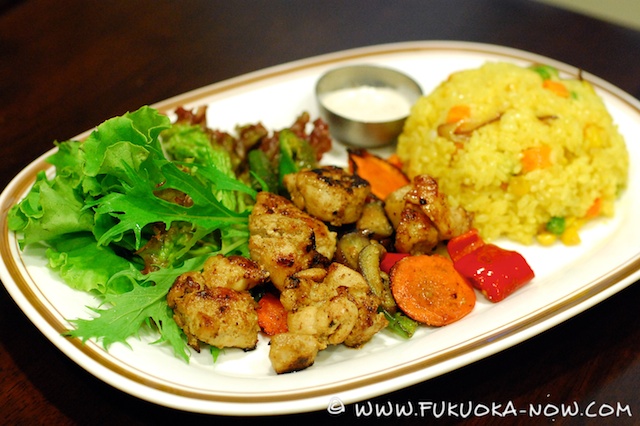
And actually, a long time before that, other friends said, “We want to go eat your food whenever we want — not just when you have a party, because that doesn’t happen as often as we want to eat your food.” That’s one of the things that stayed in the back of my mind, and kept tickling there!
So that’s how I started. It’s also a good service to my own country, because this was also a sad thing for me, that Japanese people don’t know Sudan at all. I thought before I came that there are many reasons people should know Sudan, being the biggest country in Africa, having the longest river in the world. Just by studying geography, people should have heard of Sudan somehow. But no, they hadn’t! It was a shock for me. And I thought, maybe I could introduce Sudanese culture through its food.
So you were a pioneer, in that sense.
Yeah, maybe! [laughs]
What brought you to Japan in the first place?
I came with my husband, I got married to him before I came to Japan. Since he was a kid he loved electronics, and they had at that time a Japanese team of engineers in charge of a national project near their house in Sudan and he saw how good they were with electronics. He went to the University of Khartoum for electrical engineering, and as he learned more about electronics, he realized that Japan is one of the most advanced countries in the field of technology. So my husband wanted to come to Japan one day to practice what he loves. That’s how he came to Japan and marrying him was what brought me here!
What’s it like raising a family in Japan?
In ways it’s good; in ways it’s challenging. It’s safe — this is one good thing. It’s safe. In Sudan, before I came here, it was as safe or even safer back then. Though safety wasn’t the biggest thing in the beginning, I now know that Japan is safe which is lucky for my family. They also have a good chance to learn more about the international community being here — a bigger chance, probably, connecting with many different nationalities. That’s another plus.
Another thing is that here, we grow them up on our own — my husband and I don’t get a lot of interference from outside. When you are in Sudan, everybody grows them up with you! It’s always the family together, and the house and the community is always open, so even if you are saying, “Do this,” or “Don’t do that” you will find that their grandma or their aunt or someone else even a neighbor, will be there and they will say, “Oh, why don’t you let them — it’s okay!” In this way, It’s really tough in Sudan! [laughs] Of course you can go up to people and just tell them to let you teach your kids, but it will put you in trouble with most of them, they will probably think you are being rude and snobbish.
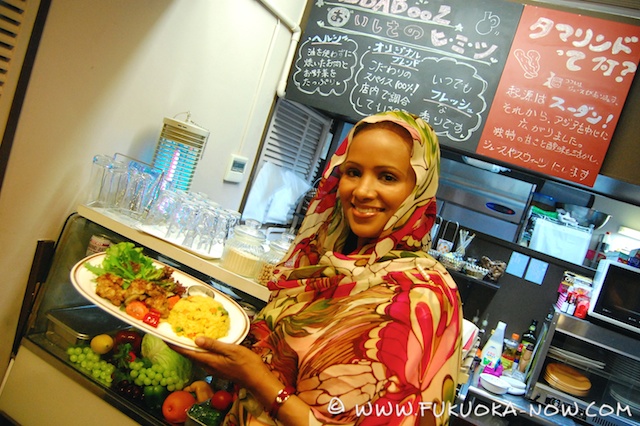
Where did you get the most practice for your cooking?
From my mom, directly and indirectly, I always loved her food — even when we went to other people’s houses, I never enjoyed the food as much as I enjoyed the food at home. I learned some being with her and watching her in the kitchen, but for sophisticated dishes she wouldn’t let me try! She would say “Some other time, now I’m busy, I need to finish this quickly!” She was a teacher and she always had little time because of work and having a big family to take care of! I remember when she had to leave me with my brothers and sister and go to Sudan for summer holiday — I was the eldest left home at that time; my elder brother in college, so I was left in charge and I had just finished high school. I had the kitchen all for myself — and I had my younger brothers and sister to experiment on! That was my biggest chance. Neighbors and friends would bring food, but I also took the chance to make my own — nobody could tell me to get out of the kitchen now. During that time I did learn a lot, and when mom was back she was very pleased– she let me take care of cooking from then until I had to leave for college.
My mom could even make the kisra — Sudanese thin bread — and not every woman can do it, it needs lots of practice. And some people don’t even take the challenge; they just buy it ready made. But my mom used to make it for us. So when she was not there, I tried and when she came back I was already able to make it.
My mom was my inspiration.
You incorporate an international taste with your Sudanese cuisine — can you tell us more about that?
I lived in Saudia Arabia in my early childhood, and I spent some of my childhood also in the UAE. Having friends from almost most of the Middle Eastern countries, we used to go to their home parties. And, of course, the restaurants in the UAE would be all varieties. So whenever I tried something I learned something! Even now, when I go to restaurants in Japan, I always try to figure out how it’s made. Sometimes while walking in the street I look at the glass fronts with those plastic samples, which are amazing by the way! I couldn’t believe in the beginning that they were made of plastic. My husband would say that it was plastic, and I would say “No, there’s no way I’m going to believe it’s plastic!” One day there was one [plastic sample] just on a table in front of a restaurant and he said, “Touch it.” So I touched it — oh my goodness! Those things, those samples, are very good for me to study when I’m walking in the street, I like looking at them and trying to figure out how the dish they depict is made. It actually doesn’t go by intention — it’s automatic, the thoughts run through my head. It’s the passion, probably.
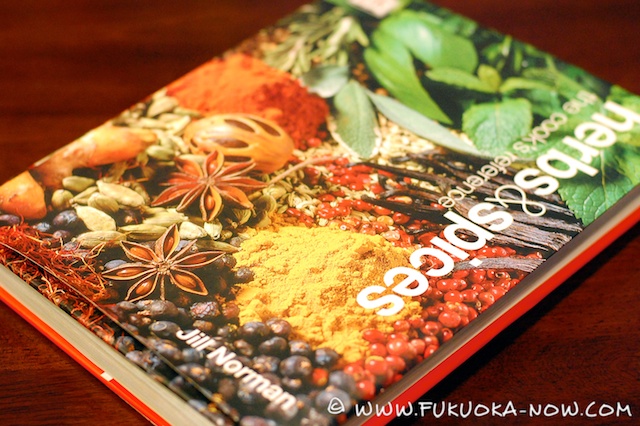
You always keep your Japanese customers in mind when you serve your food at Kebabooz — how does that work?
When I think about it, I don’t put any Japanese style ingredients in my food. For example, if you go to a Japanese style Indian restaurant, sometimes you find “An-naan,” or anko naan. I also learned that in Indian restaurants, they try to make the “amai” curry to adapt it to the Japanese palate, so they even add “nama” cream. Well this is not the type of things I do. I don’t add any special or extra ingredients to adapt it to Japanese taste– it’s just the same Sudanese stuff, but I may adjust the portions of the ingredients. Even the food I’m serving in the shop I could serve in Sudan — and nobody would notice the difference. They would not feel that it’s not Sudanese.
In Sudan, we don’t have a decided recipe or taste — it’s up to the cook, from one house to the other, it’s different. I try not to adapt the food, but to make it as accessible as possible while maintaining the Sudanese original taste. Even for well known Middle Eastern dishes that we offer here, they maintain a strong Sudanese flavor.
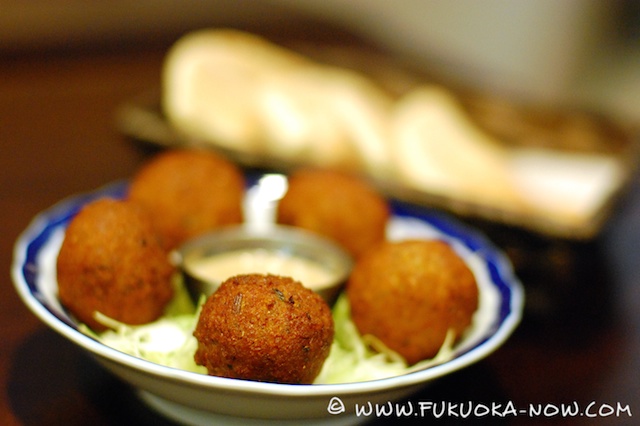
For example, Hummus! Hummus is all over the Middle East, but Hummus here has a Sudanese flavor very clear in it, and if you know Hummus you will notice it and love it. I want to introduce the Sudanese food experience to Japanese people as authentic as it can be, and I’m confident the majority will love it!
When customers come to Kebabooz, they not only get to experience the food, but also the whole Sudanese cultural experience. Tell us about that — what were you aiming for with this?
I wish that I planned for the restaurant before I came back from my last trip to Sudan — I would have brought more stuff! These are the things I had at home on display. This is my wedding scarf! The masks on the wall are made of ebony. Unfortunately it’s hard to get these now in Sudan, as they are made in what’s now known as South Sudan, an independent country. When we went last time, separation was not yet set — it was still one country, the way I have always loved it. But ebony trees grow in the south, and Southern people are very good in carving them in different shapes, and even table utensils and tableware.
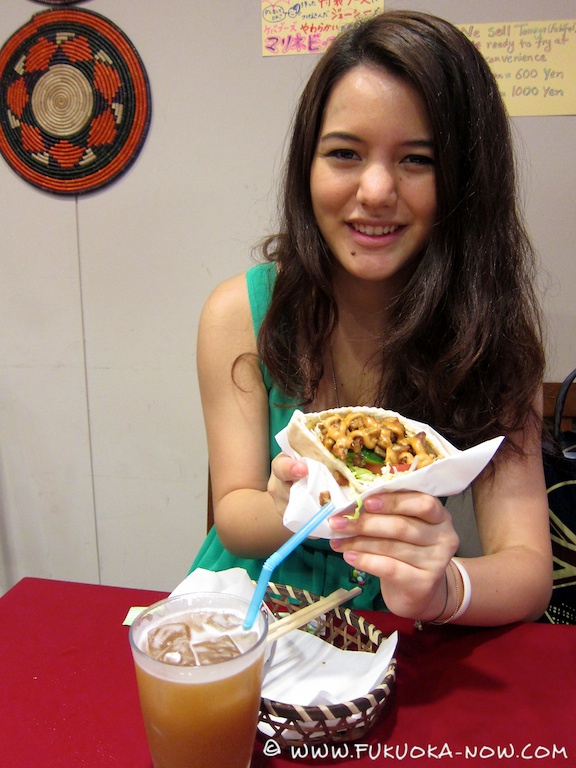
Fukuoka Now reporter Rachel Cantrell enjoys a kebab and tamarind juice at Kebabooz.
What have you learned from running Kebabooz and living in Fukuoka?
Of course, I’ve learned a lot. The most important thing I’ve learned as a Sudanese person is to be proud of my culture. I’ve learned also to be proud of being in this kind of business. Unfortunately in Sudan there is still a kind of taboo around the restaurant business — they still think it is lower than others. It was a very hard thing to accept for my family and my husband’s family. They think that since they have sent us to good schools to become doctors and veterinarians. They think it’s a waste, that this kind of business, even illiterate people can do. So although having your own business is something good, a catering business is not considered of the highest profile.
But living here in Japan, I’ve learned to appreciate every kind of job. All kinds of professions that are useful to their community, introduce something good to the community. I’ve learned to appreciate the efforts of others.
There’s this word, “otsukaresama” — I love this word. I love it. I wish I could find a similar expression in Arabic that says exactly this same. “Otsukaresama”, it is really a good expression. Everybody is doing something, it doesn’t matter big or small, we are thankful to them, and we express that by saying “otsukaresama.” Back in my country, many things are taken for granted, or not satisfying enough, maybe — I don’t know.
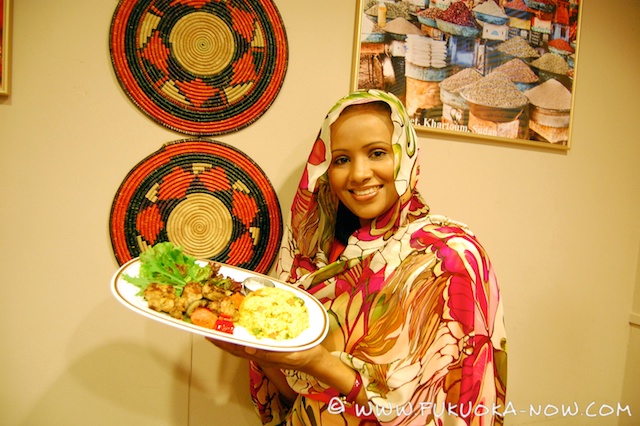
But here, I learned to be proud of who I am. I don’t need all these titles preceding my name to appreciate myself. This restaurant gave me something that I really appreciate a lot: even if one day I don’t go far in the business, I’ve learned to appreciate myself. I think it’s out of love that my parents always wanted the best for me, and were always pushing towards the best. Many parents do this — whatever you do is still not good enough. I think it’s a parenting thing all over the world — people want their kids to be the best. I always wanted to please the people around me. Of course, it’s difficult to please everybody, so I would always blame myself and always feel that I was not doing what I should be doing. But through this work, I learned to appreciate what I’m doing, and be proud of myself.
All of my Sudanese friends were very excited. Actually, it was on a TV program – on RKB — when I first opened the restaurant and I put it on my Facebook, and everybody was sharing it with their friends. All of a sudden I was treated almost like a national hero! I was so surprised. Things like, “Yes, go girl, you are introducing our culture in Japan, and that’s very good!” People were so excited, and my Sudanese friends that are living in the US and other countries started to say “Well that’s inspiring, maybe we can start something like this, too.” So yes, I think I did something good — I’m not sure how good yet, but there’s something good here.
Originally published in Fukuoka Now Magazine (fn165, Sep. 2012)


ليست هناك تعليقات:
إرسال تعليق